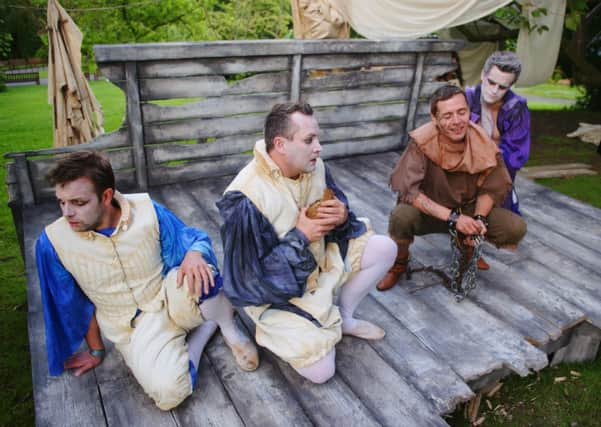Shakespeare in Glasgow Botanics returns once again


Some of the audience will have brought their own chairs or blankets to sit on, others will be hiring small plastic stools from the box office, and most will be slapping on midge repellent. The show will be a rollicking and cheekily topical version of The Comedy Of Errors, set to indulge in some pre-referendum jokery by imagining England and Scotland as the play’s rival cities of Syracuse and Ephesus; and if the weather is kind, the audience will still be there a couple of hours later, applauding Gordon Barr’s 12-strong cast of professional actors and Royal Conservatoire students, as the summer light fades into night.
There’s no phenomenon in Scottish theatre more admirably stubborn in its survival, and more impressive in its achievement against the odds, than the annual Shakespeare season in the Botanics, led by Gordon Barr for the last 11 years. Thirteen years on from its first season, the event remains almost wholly dependent on box office income; it receives no funding from Creative Scotland, and only a small audience development fund from Glasgow City Council. And because most of its shows take place outdoors – although some are also staged inside the gorgeous Kibble Palace – the whole event is desperately vulnerable to the weather; back in the monsoon season of 2012, a fascinating version of The Tempest, starring award-winning actor Stephen Clyde, struggled to complete more than two or three of 12 planned performances.
Advertisement
Hide AdYet somehow, the Bard In The Botanics phenomenon not only survives but thrives. This year, in a season with the overall title What We May Be, Barr hopes to look at issues of belonging and identity, not only through The Comedy Of Errors, but also through a three-handed short version of Henry IV staged in the Kibble Palace, a version of Henry V with a cast of 17 set during the First World War and staged by his associate director Jennifer Dick, and a new version of Hamlet from the young company Wilderness Of Tigers; and according to Barr, there are three main reasons why he is able to stage such am ambitious programme.
The first involves the audience, who, according to Barr, are astonishingly resilient, both in their commitment to the season in general, and in their determination to sit through a performance come hell or high water, once it has started; it is, he says, always the show that has to be stopped because of unsafe weather conditions, long before the audience gives up. Secondly, there is his core company of professional actors, an extraordinarily talented group whose ability to tackle huge Shakespearean roles has visibly grown with the years; two of his leading men, Kirk Bage and Paul Cunningham, will be back again this year.
And then finally, there is Shakespeare himself, the unparalleled genius whose great dramatic poetry brings those actors back year after year, despite modest pay and hazardous weather. There are, of course, plenty of summer touring companies who bring Shakespeare’s plays to beautiful outdoor settings. But where their work is often focused on just a few familiar Shakespeare favourites, Barr and his company have now tackled 26 of Shakespeare’s plays, including rarities like Titus Andronicus and Pericles. “We have to balance the programme, of course,” says Barr, “and we hope this year’s season reflects that – The Comedy Of Errors is a popular choice, while there hasn’t been a production of Henry IV in Scotland for perhaps 40 years. Over the next decade, though, we’ve promised ourselves that we will finally complete all 32 of the plays. We have plenty of plans to tour our work more, and to build our audience; and my guess is that in ten years’ time, come the end of June, we will still be here.”